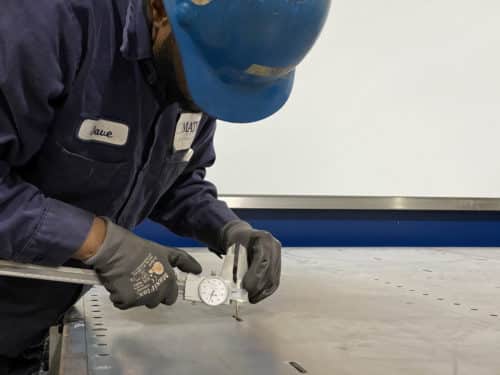G.E. Mathis Company is in the business of precision. We fabricate and supply high-quality parts, perform machining and contract manufacturing services, and help our clients create innovative solutions. Since our company’s start in 1905, we’ve been a leading provider of more than just manufacturing and fabricating services—we’re also committed to quality control, excellent customer service, and ensuring each part we supply is built to last.
Establishing robust quality control processes is essential to our mission, and Production Part Approval Processes (PPAPs) are a critical aspect of this. A PPAP is a standardized way to communicate about designs and production techniques throughout a manufacturing project in the aerospace or automotive industry. Learn more about the role of PPAPs in the industry, their benefits, and how to get the most value from them during your next manufacturing project.

When Are PPAPs Required?
PPAPs are the final step in a broader Advanced Product Quality Planning (APQP) process. Its core purpose is to ensure parts manufacturers can scale up production to fulfill an order while still maintaining consistency, quality, and adherence to design requirements. PPAPs come in different levels of stringency, and customers can request their own requirements for a successful PPAP. For example, PPAP documents may include a detailed part dimensional inspection report so parts can be mapped to a layout, or they can just set general expectations.
Some of the key information a PPAP document provides includes:
- Details about part approval processes to ensure standard practices are followed
- Processes for approving part changes or method changes
- Required information that will be shared regarding part conformance and related data
- Record of conformance, including measurement of drift
- Design records that can be used to trace part design status throughout the project
While it occurs near the end of the planning process, customers can request a PPAP—and specify the details—early on in the business arrangement, such as in the provided Supplier Quality Assurance Manual (SQAM) or in a purchase order. In terms of the total manufacturing project, PPAPs are required when:
- A change is made to a planned production process
- Parts undergo a change
- A customer requests one (at any time during the product’s lifespan)
PPAP Benefits
Having a production part approval process that is standardized and fully understood by all parties can ensure a project goes smoothly and everyone has appropriate expectations for every stage of the manufacturing process. Key benefits include the following:
- Consistency: Stakeholders can use a standardized part approval process that is well-documented and offers consistency throughout the project.
- Conformity: Customers can be certain that approved parts meet their defined requirements.
- Documentation: Customers have evidence that the process is stable, remains consistent, and will follow established norms throughout production.
- Controlled Approval Process for Changes: Stakeholders can retain control of the process, even if it undergoes changes. PPAPs establish controlled approval mechanisms and channels so no changes threaten nonconformity as the project continues through later production stages.
Levels of a PPAP Submission
PPAPs can be customized to meet unique customer requirements, or they can operate within one of the five standard levels of PPAP submissions. These five levels are:
Level 1
This is a basic level. Submissions include a Part Submission Warranty (PSW) and no other documentation.
Level 2
This level requires a PSW, as well as product samples and some degree of agreed-upon supporting data.
Level 3
At this level, documentation includes a PSW, product samples, and comprehensive supporting data.
Level 4
This level offers more customized requirements. Along with a PSW, customers can set their own requirements for additional data and samples.
Level 5
This is the highest level. Documentation includes a PSW, product samples, and comprehensive supporting data. The information will remain available for stakeholders to review at the manufacturing site.
Manage Higher Quality Processes With G. E. Mathis
Quality control is our top priority at G.E. Mathis Company. Our company is ISO 9001:2015 certified, and we provide the following services to maintain a high level of product quality:
- Capability Studies (Statistical Process Control)
- Conflict Minerals Reporting Template (CMRT)
- First Article Inspection Report (FAIR)
- Production Part Approval Process (PPAP) (all levels available)
Our clients trust our dedication to high-quality manufacturing services and quality control management. Reach out today to learn more about quality assurance processes, metalworking capabilities, and more before starting your next order with us, or request a quote for pricing details.














